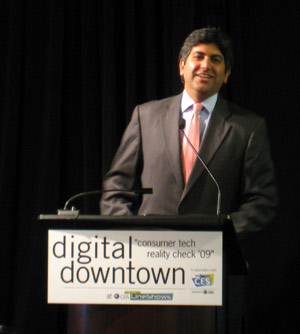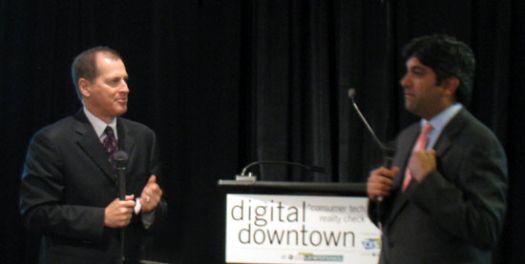Our country's first ever CTO (Chief Technology Officer), Aneesh Chopra spoke at this week's Digital Downtown event in New York City on two different but interconnected topics: the role of government in technology and the role of technology in government. With an effusive introduction by Gary Shapiro, President and CEO of the CEA (Consumer Electronics Association), Mr. Chopra took the stage in front of an enthusiastic crowd of consumer electronics journalists and analysts to outline his thoughts on the major challenges facing government in the current economy. The takeaway? Government must take heed of the lessons learned by the private sector: innovate, become more efficient, or perish, and the road to success is paved with the proper application of technology.
Chopra described his four pillars of technology's role in government:

Chopra was adamant in stating that he felt the solutions to most technological challenges lay in government facilitation, not in legislation. Of course, money will need to be allocated in order to solve problems, but true success can only come with collaboration between government and the private sector. The federal government may not be able to guarantee all citizens access to free or inexpensive high-speed internet connections, but by opening a dialog and partnership with the ISPs in Virginia, Chopra was able to develop a coverage map of who does have high-speed internet access (and where) so the state could take the first steps in identifying the scope of the issue, viewing details of where the white spaces (areas with no broadband coverage) currently exist and how extensive they are.

Also, Chopra is a big believer in measurement and accountability so he is helping to develop a scorecard system that will allow the administration and citizens to measure his progress while in the job. He has implemented something similar in Virginia already with the Virginia Performs web site, which provides state residents a scorecard of exactly how their tax dollars are being put to use.
In terms of the week's hottest topic -- the analog TV broadcasting shut-off which occurs tonight at midnight -- Chopra had some specific advice, "Call 888-CALL-FCC and they'll help you out." With nearly three million people estimated to be unready for the DTV transition, let's hope they have a lot of phones.
Related Articles: